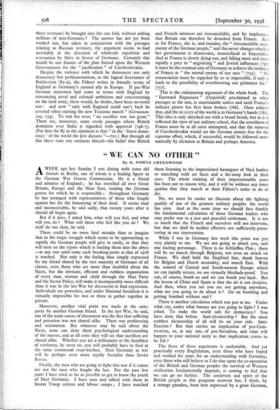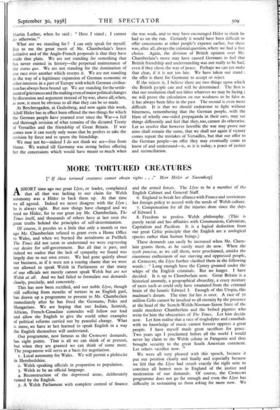" WE CAN NO OTHER "
By H. POWYS GREENWOOD
AWEEK ago last Sunday I was dining with some old friends in Berlin, one of whom is a leading figure in the German War Graves Commission. He is a friend and admirer of England ; he has travelled all over Great Britain, Europe and the Near East, tending the German graves for which he is responsible ; throughout Germany he has arranged with representatives of those who fought against her for the honouring of their dead. It seems mad and inconceivable, he said sadly, that twenty years after it should all begin again.
But if it does, I asked him, what will you feel, and what will you do ? What will those who feel like you do ? We shall do our duty, he said.
There could be no more fatal mistake than to imagine that in the tragic struggle which seems to be approaching so rapidly the German people will give in easily, or that they will turn on the regime which is leading them into the abyss —at any rate until some such breaking-point as that of 1918 is reached. Not only is the feeling thus simply expressed by my friend shared by the ,vast majority of Germans of all classes, even those who are more than doubtful about the Nazis, but the intricate, efficient and ruthless organisation of every man, woman and child through the Nazi Party and the Secret Police, will make it incomparably more difficult than it was in the last War for discontent to find expression. Individuals are powerless, and under National Socialism it is virtually impossible for two or three to gather together in private.
Moreover, another vital point was made at the sam: party by another German friend. In the last War, he said, one of the main causes of discontent was the fact that suffering and privation was not shared alike. There was profiteering and ostentation. But whatever may be said about the Nazis, none can deny them psychological understanding of the masses, and at all costs they will see that sacrifices are shared alike. Whether you are a millionaire or the humblest of workmen, he went on, you will probably have to feed at the same communal soup-kitchen. Nazi Germany at war will be perhaps even more rigidly Socialist than Soviet Russia.
Finally, the men who are going to fight this war if it comes are not the men who fought the last. For the past few years I have tried as far as possible to get to know the youth of Nazi Germany. I have seen and talked with them in Storm Troop centres and labour camps ; I have watched them listening to the impassioned harangues of Nazi leaders or marching with set faces and a far-away look in their eyes. The whole training of their impressionable years has been not to reason why, and it will be without any inner qualms that they march at their Fiihrer's order to do or die. • No, we must be under no illusions about the fighting quality of one of the greatest military peoples the world has seen. And at the same time we should face frankly the fundamental calculation of those German leaders who may prefer war to a just and peaceful settlement. It is not so much that the French and ourselves will not intervene, but that we shall be neither effective nor sufficiently perse- vering in our intervention.
While I was in Germany last week this point was put very plainly to me. We are not going to attack you, said one leading personage. There is no Schlieffen Plan ; there will be no march through Belgium, not even an attack on France. We shall hold the Siegfried line, thank heaven for Belgian and Dutch neutrality, and march East. With the control of Central and South-eastern Europe which we can rapidly secure, we are virtually blockade-proof. You can, of course, bomb us and we can bomb you back. But the lesson of China and Spain is that the air is not decisive. And then, when you see you are not getting anywhere, what are you going to do about it ? Go on bombing and getting bombed without end ?
There is another calculation which was put to me. Under what cry, under what banner are you going to fight ? I was asked. To make the world safe for democracy? You have done that before. Anti-dictatorship ?- But the most ruthless dictatorship of all will be on your side. Anti- Fascism ?* But that carries an implication of pro-Com- munism, or, at any rate, of pro-Socialism, and what will happen to your national unity as that implication comes to be felt ?
The force of these arguments is undeniable. And yet practically every Englishman, even those who have hoped and worked for years for an understanding with Germany, even those who still believe as I do that upon the co-operation of the British and German peoples the survival of Western civilisation fundamentally depends, is coming to feel that we can go no further. The sentiment and spirit of the British people at this pregnant moment has, think, by a strange paradox, been best expressed by a great German, Martin Luther, when he said : " Here I stand ; I cannot do otherwise."
What are we standing for ? I can only speak for myself. But to me the great merit of Mr. Chamberlain's brave initiative and of the Anglo-French proposals is that they have made that plain. We are not standing for something that has never existed in history—the perpetual maintenance of the status quo. We are not standing for the domination of one race over another which resents it. We are not standing in the way of a legitimate expansion of German economic or other interests in a part of Europe with which German civilisa- tion has always been bound up. We are standing for the settle- ment of grievances and the making even ofmajor political changes by discussion and argument instead of by war, above all, when, as now, it must be obvious to all that they can be so made.
At Berchtesgaden, at Godesberg, and now again this week, Adolf Hitler has in effect been offered the two things for which the German people have yearned ever since the War—a full and thorough revision of what remains of the dictated Treaty of Versailles and the friendship of Great Britain. If war comes now it can surely only mean that he prefers to take the revision by force and to spurn the friendship.
We may not be—indeed I do not think we are—free from blame. We waited till Germany was strong before offering her the concessions which would have meant so much when she was weak, and so may have encouraged Hitler to think he had us on the run. Certainly it would have been difficult to offer concessions at other people's expense earlier, but there was, after all, always the colonial question, where we had a free choice. Again, the division of British opinion over Mr. Chamberlain's move may have caused Germans to feel that British friendship and understanding was not really to be had; even if they chose the wayof peace. Perhaps we can yet make that clear, if it is not too late. We have taken our stand ; the offer is there for Germany to accept or reject.
If she rejects it, I believe there are two things upon which the British people can and will be determined. The first is that our resolution shall not falter whatever we may be facing ; we will prove the calculation on our weakness to be false as it has always been false in the past. The second is even more difficult. It is that we should endeavour to fight without bitterness, remembering that the German people, with the blare of wholly one-sided propaganda in their ears, may see things differently and feel that they, too, cannot do otherwise. Let us resolve that however horrible the war may prove our aims shall remain the same, that we shall not again if victory comes repeat the mistakes of Versailles, but that our offer to the German people—an offer they may eventually come to know of and understand—is, as it is today, a peace of justice and reconciliation.















































 Previous page
Previous page